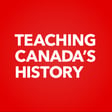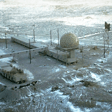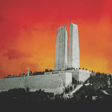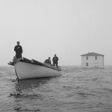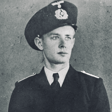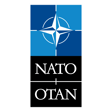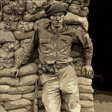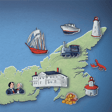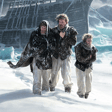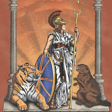Become a Creator today!Start creating today - Share your story with the world!
Start for free
00:00:00
00:00:01

Interdisciplinary Connections
This episode features Stephanie Gibson, Michele Cumberland, Rodney Squires, Hillary Weppler, and Jennifer Morris — teachers who are all using interdisciplinary approaches to help their students engage critically and creatively with history.
They talk about combining history with technology, philosophy and the arts, and explore what it looks like when students are encouraged to ask rich questions, connect with their own communities, and share their learning.
Transcript
Introduction to 'Teaching Canada's History'
00:00:20
Speaker
Welcome to Teaching Canada's History, the podcast where we explore how educators are bringing the past to life in classrooms across the country. I'm your host, Brooke Campbell. In this special series, we're speaking with the finalists for the 2025 Governor-General's History Award for Excellence in Teaching, a national award that celebrates innovative and impactful approaches to teaching Canadian history.
00:00:41
Speaker
These conversations highlight how teachers and students are working together to interpret the past, connect it to the present, and share stories that matter.
Interdisciplinary Approaches in History Teaching
00:00:48
Speaker
In this episode, I'm speaking with Stephanie, Michelle, Rodney, Hillary, and Jennifer, teachers who are all using interdisciplinary approaches to help their students engage critically and creatively with history.
00:00:58
Speaker
We talk about combining history with technology, philosophy, and the arts. and explore what it looks like when students are encouraged to ask rich questions, connect with their own communities, and share their learning. I hope you enjoy this conversation as much as I did.
00:01:11
Speaker
Welcome! Thank you for joining me today. I'm really looking forward to this conversation and to learn more about the different approaches you all take to making history engaging and relevant for your students.
00:01:23
Speaker
Let's begin with a round of introductions.
Meet the Educators
00:01:25
Speaker
Will you introduce yourselves and share where you teach and what grades or what classes you teach? Maybe Stephanie, you could start. Oh yeah, Michelle, you go first.
00:01:35
Speaker
I'll start. yet my name is Michelle Cumberland. I'm in Penticton, BC. I teach English and Social Studies 8 and 9 and some music. by I'm Stephanie Gibson and I teach in Toronto, the TDSB.
00:01:51
Speaker
teach history, Canadian history, the grade 10 curriculum in French and in English, world history, mostly in French and grade 12 philosophy as well.
00:02:17
Speaker
I can go next. My name is Hillary Wepler. I'm from Terra, Ontario, and I teach with the Blue Water District School Board. um i am a communications and history secondary teacher, and I'm currently seconded to our board level where I work as a technology.
00:02:37
Speaker
And I'm Jennifer Morris. I'm from Durham, Ontario. I work for the same board as Hillary, Blue Water District School Board, and i teach at John Diefenbaker Senior School. I teach history, the grade 10 academic applied history.
00:02:55
Speaker
i teach world history, the CHY, as well as the ancient history. And I'm Rodney Squires. I teach at Prince Wales Collegiate in St. John's, Newfoundland.
00:03:06
Speaker
This is my 25th year actually teaching. First two decades, I taught Russian. Russian studies is my primary subject area. The last four or five years I've been teaching world history and Newfoundland history. So my concentration in terms of this conversation will probably be Newfoundland.
00:03:25
Speaker
Wonderful. Thank you all so much. I love that you're teaching from all across the country and that you all have you know very different backgrounds and different student groups.
00:03:36
Speaker
But I think there's probably going to be a lot of overlap as well in what drives your work and what resonates with your students. So to start it off, perhaps you can reflect on the teachers in your own life a little bit.
00:03:49
Speaker
Is there a teacher who inspired you or influenced how you teach today? Any stories you want to share?
Michelle's Inspirational Teacher Story
00:03:58
Speaker
I can start if you want.
00:04:00
Speaker
I was thinking about this one. it's a It doesn't seem as impactful as it was when I described it, but in grade seven, I had a brand new teacher. He was right out of university.
00:04:11
Speaker
And um I was not the tidiest of students, nor did I care as much about every subject as I did about social studies even then. So I remember I used to keep an immaculate social studies notebook and the rest of them were terrible.
00:04:26
Speaker
And used to collect our notebooks. And every time he would ask me for social studies, like knowing that that's the only one that's showing, you know, my absolute best examples of learning kind of thing.
00:04:38
Speaker
And I just remember thinking like how, as an adult, looking back, thinking how he... he knew like to come to me where I was at instead of coming to me where I was not at and trying to make me get there, you know? So yeah. And i actually got to meet him again about 10 years ago. So this is a long time later.
00:04:59
Speaker
um we ended up in a meeting together here in Penticton, which was really interesting. um And I got to kind of talk about what his, you know, first year of teaching was like, and that was up in Prince Rupert. So yeah, you know, ah a rough-ish town and a big school with huge classes.
00:05:13
Speaker
And he was probably like 22 or something back then when I think about it. But yeah, I just thought, you know, that the fact that he realized that that was going to make me continue to feel good about what I was doing. And he did it.
00:05:27
Speaker
And it was great. I love that. Does anyone else? Oh, Stephanie.
Stephanie's Educational Journey
00:05:33
Speaker
Sure, ill I'll jump in. Seems we're going in in order. I don't know if we want to keep doing that. So i've I took this question in a slightly different way. um I've been teaching for, i guess, almost 30 years. think next year is my 30th year teaching, which I'm trying to get my head around. I was very, very young.
00:05:55
Speaker
And I feel like the breadth of my career at this point has gone from, i used to handwrite everything and photocopy to, you know, AI and all that we're dealing with now.
00:06:08
Speaker
And i just really had such good fortune to learn from some of I would call the giants, you know, that were the, you know, my first boss was one of the first French immersion teachers. I got to learn from her, you know, ah two amazing history teachers that I worked with, Rose Feinmeyer and Mel Greif, giants in their fields.
00:06:37
Speaker
I've just been very fortunate. I have to mention those names, you know, um, And my kindergarten teacher, strangely enough, you've just made me think, Michelle, she was a world traveler. I lived in Northern Ontario and our world was limited.
00:06:51
Speaker
And she brought the world to us. And I ended up living with her when I did my teachers, when I when i went to OISE. And that was, you know, so I think, yeah, I've been very fortunate with the people that I've encountered.
00:07:04
Speaker
Yeah.
Jennifer & Hillary on Inspirational Teaching
00:07:09
Speaker
sweet I'll jump in So um thanks for bringing up to both teachers that you that taught you and teachers you've worked with, because i I kind of interpreted the question the same way Stephanie did. And i I thought about when I was in high school, I really encountered two English teachers, Mrs. McGill and Mr. McEwen, and they were the first teachers where it was less about rote and memorization. It was about critical thinking and discussing ideas.
00:07:42
Speaker
And again, they taught English literature and that was kind of where I came alive as a student. And then in terms of teachers that have impacted my own teaching, i would have to say Heather Bender um an amazing history teacher that I got to work with. She's just retired.
00:08:03
Speaker
And um she really drove home the idea that history should be engaging. it should be rigorous. um But it's all about the transferable skills as well and how history is not just for people who are going continue on in history. it's for everybody. It's for you know people who want to go into any field because, again, those critical skills um those critical thinking skills are so important moving forward.
00:08:34
Speaker
and um I'll just continue on because we're in the same screen. um But when I was thinking about this question, I thought about a lot of really wonderful teachers I've had in my life, both in the classroom and out of the classroom.
00:08:50
Speaker
And I hope this doesn't shock you, but I'm really inspired to work with Jen and I learn a lot from her. Teaching is my second career. And when I started, moved into the classroom, Jen has been such an incredible mentor. And I find it so inspiring how She's always looking for new projects, new ways to engage students, and is so willing to work and be collaborative with others, but also try new things. And I really try to emulate that in my own teaching as well.
00:09:20
Speaker
I paid her to say that. um i But it's true. I just like that's been such a joy of doing this project with Jen is getting to see her in the classroom more intimately than you would normally see other teachers and just kind of collect all these little treasures and lessons that she gives me along the way. So it's been really special. Thanks for that. you're welcome. Thank you.
Rodney's Passion for Language and Culture
00:09:47
Speaker
And I would have to say it's a grade 10 and 11 French teacher of mine. Her name is Val Pike. She also taught Prince Wales Collegiate. um He inspired to me the love of languages and culture, which of course also relates to history.
00:10:02
Speaker
But I would be remiss not to mention my university professor, Dr. Stuart Durant. um who, you know, really pushed me on to travel to the Soviet Union, then Russia, and to go to university there and set up a language program for the students of Prince Wells Collegiate and Russian.
00:10:18
Speaker
and Those two people, I would say, are the two that most inspired me. You know, Rodney, i have if it's okay, I have to jump in because um I also studied Russian and Russian In 1993, I went to, i traveled, so probably a different timeline.
00:10:38
Speaker
um And I've never met anybody else, actually. That's
Teaching Russian Studies in Newfoundland
00:10:43
Speaker
such an interesting, it's kind of niche. Yeah, I got my BA first, and then i traveled to Russia and I studied ah teaching Russia as a foreign language 1994, one year after you were there.
00:10:59
Speaker
And then I came back, went to University of Toronto, got my master's in Russian studies. And after that, I pitched it to the school and they bought it. And I went on for 20 years and traveled to Russia, I would say about 12 times with my students.
00:11:14
Speaker
Exchange program in addition to the to the language and culture program that I was teaching. Unfortunately, yeah, sorry, go ahead.
00:11:25
Speaker
Oh, no, I was just going to say in 1999, my only opportunity was we had a Russian history course and i and it was OAC grade 13 and I was able to teach it. And that was such a dream. And that was it for me.
00:11:36
Speaker
course so According to the Russian embassy, I've had two ambassadors visit my classroom over the years, Vitaly Chortkin and Darchev, who was actually now the ambassador to the United States of America.
00:11:48
Speaker
But according to them, I was the only person in the public school system who was offering full program in Russian studies. um So in terms of ah this podcast, you know, you might say, well, what what are we talking about Russian language? Well, I also taught Russian history along with the language. And I think it it created a lot of Russophiles and it bridged the gap between us and between them. And there's a lot of students now have a greater understanding ah of Russia. It's not a Russophobia. It's more of a Russophilia right now.
00:12:17
Speaker
but Once we get into our projects here, you'll see that you know my myself probably my first love is is the history of Newfoundland. But yeah, I was quite proud of that program for many, many years. And unfortunately, when COVID hit in 2020, we were about to lose a few teachers, a few units, and the school had no choice. But as you know, usually you know projects like that or courses like that get the first or the first to be caught.
00:12:40
Speaker
Even though it was successful, lots of students enrolled.
00:12:48
Speaker
so interesting that's so cool i love that connection who would have known that there's like that's a surprise to me as well and i also love how you you know you all have a lot of similar encounters with the teachers who have helped shape your lives both you know from when you were when you were students yourselves um or when you young young children and younger learners to when you were you know in your university days and and be learning to be a teacher, all of that. It's really cool to hear, you know, what makes you, what maybe inspired you a little bit along the way and and how that shapes who you are today.
Innovative History Projects
00:13:21
Speaker
You know, you've you've all kind of already alluded to the fact that you have designed a project ah that's helped, you know, your students engage a little bit more deeply with with Canadian history.
00:13:31
Speaker
I'd love to take a moment now to to talk about those projects and for you to give us a bit of a higher, you know, overview of what those projects were. and I am going to switch up the order. So maybe just for fun, why not? So maybe Rodney, maybe you can go first. Can you share what you've done in your classroom?
00:13:48
Speaker
Sure. Yeah. so So my project was basically the students had their cumulative project at the end was a, um they had to do a short film on a significant event in Newfoundland history. And now I usually, i have to explain the course first to understand how this all comes together. So the course,
00:14:06
Speaker
course is called Newfoundland Labrador Studies selected topics so depending on where you're teaching in the province each church gets to teach in depth or as broad as they want on their community being located in St. John's obviously I go a little deeper into St. John's history but the course is designed so that you do a broad history of Newfoundland you do a broad history of Newfoundland but then you also go deep into significant events and I usually choose four to five significant events to talk about. And you know a significant event is the depth of the consequences, the number of people affected, and of course the duration of the event. I usually do World War war one the but the Battle Beaumont-Hamill, July 1st, which most of the Newfoundland Regiment was wiped out.
00:14:48
Speaker
The Confederation debate, whether we should or shouldn't have joined Canada. We do resettlement and of course the Cobb Moratorium in 1992. The students were not just to retell those stories, but they were to basically related to how it affects us today.
00:15:06
Speaker
right That was the key component. was Yes, you choose a kind of significant event, but how does it affect us today? The course is really interesting because it's not just about history. For every single unit, there's an art section.
00:15:20
Speaker
so For example, the students study, um they do storytelling, they do comic writing, they do photography, they do script writing, they do songwriting, and all of this leads up to the filmmaking.
00:15:32
Speaker
And as you know, when you're doing a film, all of those elements I just described lead into film, okay, leads into or, you know, contribute to making a film. When I divided the students into four groups, they took on the particular roles of a film crew,
00:15:50
Speaker
So some were responsible for location, some were responsible for script writing, some were responsible for the storyboarding, etc., etc., okay? Some were behind the camera, and some, of course, were the actors.
00:16:03
Speaker
In some groups that were smaller than others, they took on more than one role. And basically, that's what they had to do. And it's if you if you know anything about Newfoundland, right now we're probably punching above our weight across the country in terms of filmmaking per capita.
00:16:16
Speaker
We are a part now of Hollywood North, for sure, along with other places like BC and Ontario, and I guess Nova Scotia. But ah and we've always been ah people who tell our history through stories.
00:16:29
Speaker
and Most Newfoundlanders before we joined Canada, well, certainly up to the early 1900s, were illiterate. And so storytelling, things that were passed down for 500, 600 years,
00:16:40
Speaker
were being told over and over again in communities, all right? And each community had their own story to tell. um You know, it wasn't until we really joined Canada and education became came to the forefront for most Newfoundlanders that things changed in sort of writing things down.
00:16:56
Speaker
So the storytelling was really, really important. And now today, those stories are being told through film, primarily through film. Also, if you listen to Newfoundland music, you know it's ah also told through song.
00:17:09
Speaker
So the course, you can actually get two credits for history or you can get two credits for arts ah by studying this particular course. And that final project basically takes a whole ball of wax, puts it into one one project.
00:17:22
Speaker
Thanks, Rodney. That's wonderful. Hillary and Jen, do you want to share more about what you've done in your classroom? Okay.
Mapping WWI Journeys
00:17:29
Speaker
The area that we come from and that we teach in is very rural.
00:17:34
Speaker
um Even though we're only two hours away from Toronto, it's still very... A lot of the same family names in the small towns are the same as they were 100 years ago. And so this kind of affords a wonderful opportunity to look at how World War I affects still our communities today. And so the...
00:17:55
Speaker
Project in a nutshell, I've done this for years and this is not a new idea where you take personnel files that are available through the National Archives and you have students review the personnel data, the raw data from the personnel files.
00:18:13
Speaker
But what we wanted to do differently, we wanted to incorporate technology into this project a little bit more and so What I did was um I collected on an Excel file all the names from the 147th grade battalion. um And then all the home addresses that are in our school catchment area, I zeroed in on them.
00:18:37
Speaker
And then students can choose a name from that list. Sometimes they'll find, oh, there' there's several relatives. on that list. Or um if they have somebody and they're from another area and they have somebody who's related to them, we let them choose their relative, of course. But um They choose a so soldier from the West Gray area, and we urge them to choose somebody who lives on their street or came from their street if possible or from their, you know, township, country road or whatever. And then what we do is we use the students have to plot out timeline of events.
00:19:13
Speaker
So they have to kind of they have to ask good questions and make sense. The data that they're seeing in this these personnel files And they have to figure out 10 important events of their soldiers' war journey.
00:19:27
Speaker
And we use a mapping technology then called ArcGIS Story Maps. And this is where Hillary came into the picture. She's our tech advisor for, I always forget your official title, but she she kind of thought, okay, Story Maps is a great way to bring this to life.
00:19:45
Speaker
And so students take the the personnel files from a soldier from their neighborhood and they create a a digital interactive map where they can plot out all the places um their soldier went to for their for their war journey. And it it's kind of it's a huge project. It takes us a lot of time.
00:20:06
Speaker
Students, I often find myself saying, you need to be more curious. Like it really forces them to ask good questions to get to the secondary research stage. And so it's a big project And what they end up with is a ah digital display or interactive map that um they can share with their peers, they can share with their families.
00:20:29
Speaker
um And more recently, our local museum has been taking these maps and using them as displays for public history. So it's open to the wider community now.
00:20:42
Speaker
So did I, how did I do for explaining? It's always, I'm like, I don't know where to start. i don't know how. to So yeah yeah, that's what we did. Yeah. I think I just really want to emphasize from what you said about asking good questions that because all of the soldiers are local and maybe not necessarily names a student can just Google and come up with a full biography of the student. The project really forces them to dig deeper, become a champion of their soldier,
00:21:11
Speaker
make inferences and connections and really like dig in and figure out where their soldier was um in the greater kind of timeline of World War I. And the whole thing becomes a lot more personal to them. um And they're able to really dig in. them yeah Yeah. We found it centers the student like they have this mission now. They are the voice for the soldier that maybe no one has heard of or heard from for over 100 And so they have to decide what's important, what's ethically appropriate to include.
00:21:45
Speaker
um And ah will there be impacts on the community today? there are still a lot of living relatives who live in this area. But it's also fun because we we, a lot of the kids in our area have never traveled very far out of our neighborhood.
00:22:04
Speaker
And so a lot of them will never have the opportunity. Hopefully they will, but a lot of them will never have the opportunity to to go over and see the actual grave sites or places where people from their neighborhood went so long ago. And so this is, I don't want to say the next best thing because nothing comes close to traveling, but but it kind of gives them access to the the wider world, if you will, in a way.
00:22:32
Speaker
Mm-hmm. I think the the idea of asking really good questions ties really well into Stephanie's work, actually, because she gets her students to ask really good questions too. So Stephanie, will you share a little bit more about what I...
Philosophy in History Teaching
00:22:52
Speaker
Yeah, i I too am kind of struggling how to put this into words as I struggled to put it into a package. This is kind of many years of, you know, um first of all, working with philosophy and teaching philosophy for many, many years. And I also have an ethics bowl team.
00:23:11
Speaker
and that we compete, competed even in nationals. And it's just been such an amazing experience. I find that philosophy, I'm simultaneously also trying to, yeah, the philosophy and the ethics um I found to be such a profoundly ah important way to connect ah with the kids.
00:23:34
Speaker
And there there was something really important happening, I felt. So I started to use that lens in my classroom. And so what in my history classroom, specifically in my Canadian history classroom, also in the world history, but my package is on the Canadian history.
00:23:50
Speaker
So to sort of put it into a little... Shell. It's a semester of study that I've created Canadian history curriculum, I guess, in in Ontario.
00:24:01
Speaker
And we start by primarily trying to distinguish what is history and what is the past, because I find that to be a really difficult question. So what is the truth? How do we know about what happened?
00:24:12
Speaker
um And really trying to it's philosophical in many ways. like you know we're We're making things up in many ways as historians you know as we go along and filling in gaps. And and you know in all the stories you're telling, you know putting it together in film and and interact with maps, i mean we're filling in gaps.
00:24:32
Speaker
So what does that mean? And what is our responsibility? ah So I've put it together in three major assignments. It's a big package. And, you know, each one is framed with a big philosophical question.
00:24:48
Speaker
So we start um early in the semester with an artifact study where the kids, we talk a lot about, you know, we we make so much stuff as human beings, like, you you know, but what does this stuff tell us about who we are? The kids choose an artifact, and if they don't have an artifact at home that they feel they can find, we go into our school archives because we have a pretty old school to have stuff there. And, um,
00:25:12
Speaker
They've chosen everything from a beautiful pair of moccasins to, you know, a photograph they found at home where they learned that their great aunt had actually been interned during the Japanese internment.
00:25:26
Speaker
You know, a pair of earrings that actually came from the Soviet Union. And they take that one little artifact and they tell the story through that. I've just been blown away by the work that they've done. I start with my 1960s red telephone as an example, and I have sitting on my desk and they come up and call.
00:25:44
Speaker
Which absolutely hilarious because they all think they know how and they don't, right? The social social relationships you know around these artifacts. And then quite early in the semester, they choose ah ah piece of historical fiction. And I think this has been the biggest one that's really started to... I've done it for about two or three years now. And the kids, they choose everything from Obasan, actually the student who researched their family,
00:26:11
Speaker
They can sort of continue with that theme. And he chose Obasan. And, you know, to, I mean, all kinds of different, you know, historical ah pieces. And they read the book.
00:26:22
Speaker
Or they can use an audio. There's different variations differentiating. What I found was as we were reading and talking about the history and the past and, you know, the fictional pieces in between, they were learning so much about the Canadian story behind it. And it was, you know, led by their interest.
00:26:41
Speaker
It doesn't sound as exciting as I'm speaking about it right now, but it really, really, you know, there was many pieces to it. Literacy. And one student said to me, you know, I overheard it, actually. She didn't say it to me. We chatted about it after. She said, when I'm reading about my character walking down the street, I feel like I'm walking.
00:27:00
Speaker
And it really, really hit me that they are connected in a different way. And they talked about the ethical dilemmas that their characters back to that ethics piece. That was a big focus. What are the dilemmas your character, your character is facing?
00:27:13
Speaker
So what decisions did they have to make? Do you agree with them? Do you think they make good decisions? Did they have a, you know, um, and then there's obviously a research piece. The last piece we do as a culminating is looking at ethical dilemmas that are currently, you know, that we're facing today, you know, um,
00:27:30
Speaker
How do we manage you know refugees coming into the country, questions of immigration, sometimes politically explosive questions. But then we go back and we research the roots of those dilemmas and how people of the past have dealt with those dilemmas and then what lessons we can draw in the present. So I know it sounds like a kind of all over the place, but it it really is rooted these questions of ethics and ethical discussions, and they just love it when we talk about what is the good life?
00:28:06
Speaker
What is truth? What is justice? Was this fair? you know and And there doesn't seem to be anything else that felt has engaged my students as much as that particular question.
00:28:19
Speaker
you know Sorry, that I hope that made sense to everybody. It was a lot.
00:28:28
Speaker
If I can pop it I just want to say how moved I am that you start with a physical object. My background's in archaeology, so it's like... all of the things. And I think it's so beautiful whenever I hear other people talk about how a single object can tell such a story. Cause I feel like I've spent so much of my life but before I entered the classroom and even now being like, but this one like little piece of pottery can tell us so much about the people that used it and, and what that meant for them and what they might've gone through. And, um,
00:29:03
Speaker
Some people look at you like you've lost your mind that you're so excited about this little piece of pottery, but it really tells the whole story of a whole group of people just from this little tiny artifact. So thank you for doing that with your students.
00:29:18
Speaker
Oh, thanks for saying that. Yeah, no, I really i really love that assignment. i Every time they come up with things that I learn from them every single time, every single time.
00:29:30
Speaker
Thank you. That's wonderful. Michelle, will you share about your project? I will. ah
Character Monologues on the Railway
00:29:37
Speaker
mine My project has so many little things in common with what everyone else is doing. I love hearing how some of our basic threads are so entwined.
00:29:46
Speaker
um my story was or My project was with Grade 9 Social Studies, and it was based on the move west and the development and building of the CPR. So I actually was having a coffee in my sister's hot tub one morning listening to Gordon Lightfoot's And the Canadian Railroad Trilogy came on and I've always loved that song and it's so long, you know, you get to listen to it for a long time.
00:30:08
Speaker
And I thought, what could I, like, this ties in so well with what we're about to study. Could I do something with this? So that evolved into, um, students researching the building of the CPR, and then they each chose a fictional character. a couple chose actually, one chose Johnny McDonald, and another chose and not a character that was involved in the building.
00:30:34
Speaker
um But they wrote a monologue from the perspective of that character that had to be accurate to time and place. My class is fairly cultural culturally diverse, so that was really good. We had students with Chinese backgrounds take on roles of Chinese workers or their family members.
00:30:52
Speaker
Indigenous students chose to do the same as Indigenous people that were affected by the building of the railroad. And we were recorded the videos. They they wrote or recorded their monologues. They wrote fantastic stories. It was so good. And there I had, ah like Rodney was talking about, some students were behind the camera. Some students were creating the art. Other students were writing their scripts and acting it out. And um I had a student that was great at editing. She put these together in little groups of three monologues.
00:31:20
Speaker
I contacted Warner Canada and got the permission to have the Canadian Railroad Trilogy playing in the background for these video So that was fantastic because I also teach guitar. So we were actually playing and singing that song in class and we got to go to the legislature in May and perform on the front steps. And we did the Canadian Railroad Trilogy there.
00:31:39
Speaker
so just kind of tied all these little pieces in together. But the kids really, really connected with these people and their experiences. It made such a difference in years past when I've studied the Move West or taught about the Move West.
00:31:53
Speaker
I haven't done it necessarily from a ah perspective of the human beings and what they were experiencing because of just different, for different reasons as to how we were delivering courses. But this year I had the opportunity to spend as much time as I wanted on this. And so that's what we ended up doing. They developed characters. They told their monologues. They came up with their own outfits and one of the students created artwork that we used as some background they were just fantastic and these little actors and actresses came out of nowhere you know that were just so amazing one girl was actually crying in her monologue like it was just I it was so exciting and so fun and I've since reached out to ah historian with the Railroad Society who's
00:32:38
Speaker
giving us some feedback so that if we need to or want to, we can edit. I still have contact with these same students, so I'm in a position to be able to go back and edit anything that we have to do. And our museum is going to showcase our videos as well. Here in Penticton, we had the Kettle Valley Railway.
00:32:53
Speaker
We no longer have a railway, but it's a huge part of the history here. So he's going to find a way to tie these stories about the building of the CPR in with an exhibit. So the kids will be able to go to our local museum, see themselves in this exhibit. Visitors and locals and other classes will be able to do the same thing.
00:33:11
Speaker
And um I've reached out to a couple other museums, hoping they'll give me some feedback or invite us to be a part of an exhibit. But um I've gotten some feedback, but I haven't.
00:33:21
Speaker
Our local museum so far is the only one that's found a way to incorporate this stuff. And the kids loved it. like some of them did 10 takes before they were happy with their mono monologue, you know, and they're just short, like two to four minutes, maybe.
00:33:34
Speaker
Yeah, it was probably the most exciting project I've ever done and social studies, I think. And then to tie it in with the music that we were doing, because when we were at the legislature, we just did a Canadian content only like nine songs on the front steps. And So to, you know, to be able to do that one and and handle, take that information and that learning and deliver it in a totally different way was, it was great.
00:33:57
Speaker
So yeah, that that's, that's my project. and I'm just curious, yes you know, not to be answered, but it, it occurred to me, you know, the ethical dimension of what you are doing. I mean, all of these different perspectives. Oh, sorry. you know Oh, yeah. Part of it, that that was one of the main focuses was the effect on Chinese workers and on our Indigenous people in Canada. So some of the videos are fairly dark. that They're not big, happy stories. But you have Johnny McDonald's story is fantastic and full of he's so happy about what he's accomplished. And, you know, so there are other stories. And some kids chose to be railway workers and just talked about how great it was to have the opportunity to work and, you know, immigrating from somewhere else in the world.
00:34:43
Speaker
And they were all so careful about the accuracy of time and place. They chose locations all over Canada, but made sure that what they were talking about was happening in that year in that place. it was They did a fantastic job.
00:34:55
Speaker
Yeah.
00:35:01
Speaker
So cool.
00:35:03
Speaker
Thank you all. i love hearing I love hearing it in your own voices of of what you've done and what and the projects that you've envisioned, but also then how they've actually taken shape. And these little moments of reflection are really, really special too, I think.
Arts & Technology in History
00:35:19
Speaker
And as you have all talked about so much already is... that all of these projects are really interdisciplinary. You're bringing history together with other subjects and skills, and there's lots of activity involved, and there's student voice and choice.
00:35:36
Speaker
Like a lot is a lot of wonderful things are happening here. I mean, we've got film and performance and art and philosophy and digital skills and geography and... Historical fiction. And like I feel like I could go on and on and on um with how you're integrating all of these different pieces.
00:35:53
Speaker
And so how do you find incorporating different subject areas or different skills ah into your classrooms? How has that helped deepen your students' historical understanding?
00:36:08
Speaker
Okay, so I can lead off. I think, again, the course itself naturally puts in the arts part of the course. So, you know, ah the six things I just mentioned to you earlier, some of those I'm more comfortable with teaching myself.
00:36:22
Speaker
So the storytelling, no problem. You know, when it comes to the art, fine art stuff, not as much, ah but I'll dabble in it for sure. ah But when it comes to the songwriting, when it comes to the music, when it comes to the acting,
00:36:35
Speaker
I'm an actor myself on stage and and in film, so it comes natural to me. and I think the course is designed that way and this project is designed that way, that that a teacher, depending on their comfort level with those particular arts components, can go deeper into each one.
00:36:52
Speaker
You know what I mean? and But the course itself just lends itself so naturally, the the components are so naturally inter-proven with the course. that you don't even know what's the history what's the arts it's just it's it's the same thing you know in newfoundland it's it's really the arts is what i think what drives the province to be honest with you and if you ever come to newfoundland ah you'll soon realize that can i just i'm there because have the same my project it was the same thing you know kids i've
00:37:23
Speaker
Students with so many different talents, I'm comfortable with the music side, but say the filming and editing, not my forte, but I had a student who has been doing it for years already on her own YouTube channel and was able to just jump in and do that. And by putting it across all of our different curricular areas, every student was able to come at it from their area of strengths.
00:37:46
Speaker
it across all of our different curricular areas, every student was able to come at it from their area of strength. You know, so I have a student who is an English language learner. She's not comfortable with writing or speaking in front of a camera. She did all of our background art.
00:38:03
Speaker
You know, like everybody learned and everybody was able to demonstrate what they learned from a direction that they felt strong in, which made it... That's beautiful. Yeah.
00:38:16
Speaker
Yes, I i agree. It was much the same with mine. you know and They all took on individual jobs, let's could they so you know I gave them the choice. I didn't say, you're doing this, you're doing this. They got together. They brainstormed for a couple of days, maybe more, and they themselves chose who was doing what.
00:38:35
Speaker
you know Not everyone wanted to get in front of the camera, you know for sure. It's shocking. Yeah. But the editing is amazing. What what what they can do editing wise. And they take to that editing technology so quickly. I know in the communications technology classroom, I'll like have planned out like video editing lessons that maybe take things a little slow and they're almost like, leave me alone. I know how to do things. Well, I was home sick for a day and thought I'm going to go use this program and learn how to use it so that I can help her.
00:39:06
Speaker
Oh no. yeah Like I went back the next day. I still didn't know how to do it. Yeah. And I'm like good with that stuff, but they're all like way ahead of me. And it's yeah amazing because that's all I want is for them to be better at both things.
00:39:20
Speaker
But yeah. I think that ties into our project and the way Jen was talking earlier about transferable skills. We want to give lots of options for our students to explore, with ours more so being tech-based, that maybe you're not super interested in history, but now you have this chance to use this new technology, explore this potential career pathway.
00:39:41
Speaker
The ArcGIS software is professional software that's used by Anyone from like archaeologists to urban planners, all sorts of things. So they can make and see connections beyond the history classroom, which is really important and engages students where they're at, meets them where they're at.
00:39:58
Speaker
The software is really intuitive. So even a student that might normally say like, oh, I don't like technology, they can find a way to use it. And the way that we set it up, there's lots of time for them to learn the program with it.
00:40:13
Speaker
um And like you've both incorporated multimedia, the software also invites them to incorporate videos, pictures, music, audio recordings. So it's just really great to see them kind of bridge their own personal interest and likes and building this final project that speaks to them and speaks on their soldier story as well.
00:40:35
Speaker
Yeah, I think, um you know, speaking from a high school or secondary perspective, we tend to silo things much, much too much. like And, um you know, especially we're talking about the arts and I know mine's slightly different. I mean, clearly it's with the philosophical lens, but I think philosophy is at the heart of everything. That would be my argument, certainly not my own argument. The idea that even science, you know, is part of it. Like, so when you brought up archaeology, I think it's important we look at the artifacts, you know, the science of date, like radiocarbon date. And I think history, a really big goal of mine is to sort of myth bust what we think history actually is, the history versus the past and
00:41:19
Speaker
how we create our stories, like, you know, talking about the stories. And I feel that history is also at the heart of everything. It's who we are, you know, we're making history like ah you use the, you know, at the school as an example as well of And, you know, the idea that we are constantly curating our stories. And would love to see more open doors in our schools across, especially from STEM to the humanities. That is another piece I would like to see broken down more.
00:41:50
Speaker
Yeah.
00:41:53
Speaker
And if I could add to that connection between STEM and the humanities, one thing that I really loved about this project was that having them have to identify locations and do that, that opened up even more questions. It forced them to go deeper in the research. And I've learned so much more than I knew before doing the mapping using the mapping technology, different military bases I didn't know existed, different ah logistics.
00:42:22
Speaker
And it really did bring to life the individual war stories of these these farm boys or these, you know, small town young men who, um you know, it gave us a fuller picture of the individual war experience.
00:42:38
Speaker
um And it forced their their research, their archival research to go deeper. It was it was like I was playing catch up with them sometimes to... to understand things like I was researching alongside with them, which I think is good modeling anyway, but there was a lot of, I don't know, let's figure out how to find the answer um because of the technology we were we are using.
00:43:05
Speaker
So may I, um <unk> so every year, well, we used to teach an art course at our school and it's since, no it's no longer available, but with the grade ten We took them to the Toronto archives this year and they were like, I don't know, grade 10s, you know, it seems little early for that type of research.
00:43:24
Speaker
Not at all. no The most disengaged student was just in awe of this beautiful map, you know, laid before them. um And then bringing in the science of it, the science of preservation, restoration, you know, the climate control in these rooms, like I really found it to be such an interesting experience for them to go and and learn from these archivists. So yeah, I think that's part of it as well. And I know you're close because you're in Durham, even though I know you're You're close, but you're far. Yeah. Anyways.
00:43:58
Speaker
Well, I think just I've had, as we've gone through doing this project, other colleagues at different schools that maybe see history more in that silo of study have said to us, like, well, how could you even use a computer in a history class? Like, what's the point? And it's been really amazing just us to be like, wow.
00:44:15
Speaker
let me tell you how you can use it in your history class. And age even like some students are like, I don't understand why i need to learn this program. But those like disengaged students then become so passionate about their soldier and learning this technology and sharing it through different ways. And for us, like location keeps coming up for me, like locations are so important in understanding history. And so You have to map out so many different locations using this technology. But um what I found was a lot of students became a lot more interested. This is going to sound a bit macabre, but a lot more interested in our local cemeteries, because if their soldiers survived and made it back home,
00:44:56
Speaker
um then they were like, well, can we go visit his his grave? Like, can we show, which really hit me in the heart. Like this is a ah name from a hundred years ago that, and maybe they lived on and and died in the fifties or the seventies and contributed to our small community in different ways. But these are names that haven't been heard of or mentioned in a long time. And here are these young people who actually care enough to go And we had one family take flowers to one of the soldiers' um resting places.
00:45:31
Speaker
And that hit me because I thought this name hasn't been remembered in so long and they're honoring them. um But anyway, I went on with them.
00:45:46
Speaker
And, you know, i i Like, again, for me, I see little bit of the ethics of this. Like, what is the importance of this? You know, are we have these transitory lives, some shorter, some longer? What is the importance of it? You know, why do we want to make these connections? Like ask why, why, why? Right. And I just love
00:46:12
Speaker
Well, now these soldiers are people they know now, you know, they can talk about them like it's somebody they know from their community. I think that's amazing.
00:46:24
Speaker
Yeah. And and to I mean, i made them at what while we're in the classroom, I'll say, OK, who's who's on? you know, the Olympic, SS Olympic on November 2nd, 1915 or whatever, and five hands will go up.
00:46:39
Speaker
And then you'll find out they all had mumps, you know, by the time they landed in. and And another really shocking kind of location and date that that has hit me personally is October 26th, 1917 was a horrific day for our community.
00:47:01
Speaker
Ashendale hit the soldiers in our little towns so hard. In each of the classes we've done, there's about four to five soldiers, students who have a soldier who was either maimed horribly or died on around October 26th 29th.
00:47:20
Speaker
And it just, I don't know if it has hit the students as much as it has hit me because I'm there semester after semester. But I'm like, oh my goodness, how did that change our little rural towns?
00:47:35
Speaker
How are we still feeling the impacts of that? It gives me shivers to think about how such a faraway place like Passchendaele that's famous for around, you know,
00:47:45
Speaker
the world for its role or its existence in World War I directly impacted our little rural community. Anyway, i could again, i have to stop myself because I go, oh my God, people stop, like their eyes glaze over, but anyway.
00:48:03
Speaker
So I actually do a similar activity that you do without the map, but the difference would be, i would say, is that the kids here were such a small community. Newfoundland during World War I, we sustained such losses that it actually, to be honest with you, led to us collapsing as a nation. So when we fought World War I, Newfoundland was a country. And so they study, they research at the rooms their own family members that died.
00:48:31
Speaker
And so after World War one all the best and the brightest, it wasn't just the working class kids who went over and fought. World War I, another important day, of course, like I said, is July the 1st. Now that should ring a bell for all of you because that's Canada Day.
00:48:45
Speaker
But it's not Canada Day here in Newfoundland. It's actually Memorial Day. It's our Remembrance Day. Not really in Quebec either. Oh, yeah, well... We don't, well, because we were a nation before we joined Canada and and that's our remembrance state.
00:48:59
Speaker
And so, you know, that's the kind of thing I'm trying to drive home. But it actually was a domino effect for Newfoundland that, you know, once the brightest and the best were mowed down, ah in World War I. And that particular battle was just one battle, July 1st, 1916, Beaumont Hamill. But then when we got home, we were the only dominion that wasn't forgiven its debt ah by the British. And this led to more economic problems, which led to us actually voluntarily giving up our independence in 1932.
00:49:29
Speaker
And we had the Commission of Government until World War war until ah the National Convention began in 1946 to 48, and we decided what we would do, which road to travel, stay independent, keep Commission of Government, or join Canada.
00:49:43
Speaker
And so the point I'm trying to make is that I try to draw the point home to these students that what happened in 1916, 1914, 1918, and nineteen fourteen nineteen eighteen It affects who you are today in that the fact that you're a Canadian citizen, it was a complete domino effect.
00:49:57
Speaker
And we never survived economically. And we had no choice, I suppose, at that time. Now, even though we voted very narrowly to join Canada, 51 to 49, there's still Newfoundlanders who are not happy about that. You know, it is the fact that we did join Canada and how their lives changed after that because of what happened in 1916.
00:50:17
Speaker
And so I did the exact same thing when we study in depth the significant event of World War I without the mapping and the technology, but it relates. And this is what my final project was about.
00:50:28
Speaker
Don't you had to do this film, but it has to relate to what is happening today. You know, and I think that's so very important because as I always say to my students, it's useless to study history unless you can actually look around you and say, OK, how does this affect us today?
00:50:44
Speaker
Yeah, I was just gonna say that. I mean, we don't study history to memorize dates. That's what I tell the kids all the time. You're studying it so you can understand the world you live in right now. Not to memorize what happened when necessarily, but, you know, ah how does this affect your life today?
00:50:59
Speaker
Exactly. So all of the significant events they chose. Now, I have four or five or six that I really hone in on myself, because I believe that there are certain significant significant events in our history that form who we are today.
00:51:10
Speaker
ah But they were allowed to choose anything, basically, from the beginning when the natives were in Newfoundland to, know, or still are, of course, the Beothic, I mean. who are no longer with us, but up to present, you know, they could choose anything they wanted, but I see, you know, four or five major events and most of them coalesce around whatever I see as being the most events. They were the events that they chose.
00:51:32
Speaker
Thank you all so much for all these wonderful insights and into the windows, you know, sharing windows into your classroom, as well as i think the different ways that you are all thinking about what you do.
00:51:44
Speaker
ah really appreciate you being so open with your thought processes and your
Motivations for Teaching History
00:51:49
Speaker
experiences. It's just been a really rich conversation to listen into. And I think it will be for our listeners as well. I do have one final question ah before we go. In one word, why do you teach history?
00:52:02
Speaker
I think I do it because I want students to think about how things got to where they are now. Why does my world look the way it does? And to ask questions and to be critical thinkers about the different people's recollections of history or different people's stories and that sort of compassion and relevance that they learn by listening to the stories of others who have lived different experiences and how that helps them develop an understanding of the world they have now. And I just want them to keep wanting to do that, you know, keep wanting to look at it and ask the questions. And and that the word curious has come up a few times. You want them to be curious, right? You want them to keep wanting to do that.
00:52:52
Speaker
I would say to keep the memory of but alive of of Newfoundland before it became a part of Canada, to be honest. Because when we joined Canada, I know it's not one word, but, you know, a lot of our history was co-opted.
00:53:07
Speaker
And so I think, you know, 50% of my students now are immigrants. And that was one of the comments that they made. couple of students wrote testimonials and, you know, they were just shocked at the depth of the history of Newfoundland and the contributions that we made not only to eventually Canada, but the world and what we've lived through.
00:53:27
Speaker
i think that's my main goal is just making sure that they do realize that there was a nation known as Newfoundland and a dominion known as Newfoundland.
00:53:39
Speaker
Thanks Rodney.
00:53:42
Speaker
That's a really tough question. where I think we're all probably long-winded. ah be but To be concise, i um I think there's just a few little phrases I would use um to change their minds, um to, like I said, myth bust, to change their minds, kind of surprise them about what history is about.
00:54:06
Speaker
And they're a survivor of the Montreal mass Massacre femicide, I believe it was Nathalie Provo. I'm not sure. i don't Maybe you edit that out, please. um I'm not sure if I'm 100% sure.
00:54:20
Speaker
But I saw her interviewed last year, and she said, memory leads to action. And i think that developing empathy, understanding, and thinking about those big questions um about justice, about fairness, all of these, you know, truth, teaching them to question everything through history, ah study of history, um I think will...
00:54:48
Speaker
help them to understand more what it means to be human, create a good life, and hopefully a better society. I'm a little bit hopeful and optimistic on that one. That's how we keep walking through that door.
00:54:59
Speaker
So yeah, that's it. um I think if I were... I think I'm going to piggyback on what Michelle is saying, because i I mean, there are so many sentences going on in my mind. i am long winded.
00:55:16
Speaker
So if I were to just make it one, the past matters because it informs the present so much. And also the people of the past really matter. helps us to understand who we are now. And again, I think it breeds compassion when you can When you can have somebody, a student, kind of come at things from the perspective of someone who's It was long gone.
00:55:45
Speaker
Yeah, I think I'm having trouble finding one specific word. keep coming back to like understanding or citizenship, not in the passport, but in what do you owe to your community? How do you be a good community member?
00:56:02
Speaker
And I feel like an understanding of the past and how that has influenced where you are where you live, our views on certain things is a really vital part of being a good member of your community and influencing your community in a positive way moving forward. Like Stephanie said, history,
00:56:22
Speaker
echoes and I feel like having a good understanding of that helps us to be better citizens and better members of our community and we even see that with the students they've become much more we're global citizens now that they have a personal connection to the cost of war and are asking questions about current global conflict and what it means to have a peacekeeping mission and that sort of thing so that's sort of why I teach it.
00:56:49
Speaker
Wonderful. Thank you once again, Hillary, Jennifer, Rodney, Michelle, and Stephanie. It's been a pleasure. We hope you'll tune into the rest of this series to hear more conversations with teachers about the meaningful work that is taking place in their classrooms.

